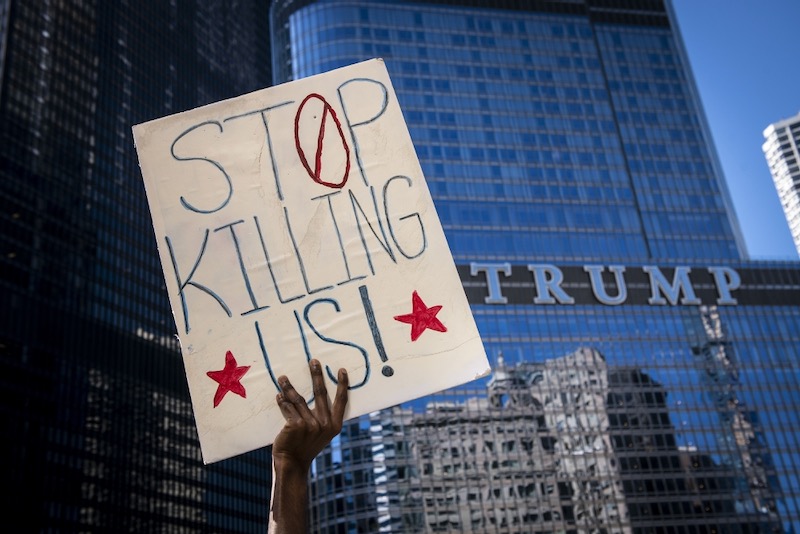Is America inching towards a military coup, the deposition of President Trump by the army? It sounds ridiculous, but this is bound to be a subject of subdued conversation when senior officers drink coffee together. How did it come to this?
Implicitly or explicitly, throughout the Western world, codes or manuals of military law forbid the carrying out of illegal orders. The soldier ordered by a superior officer to “shoot that prisoner” commits murder if he obeys. This was made a universal principle of international law in the Nuremberg trials of Nazi war criminals, and is known as Nuremberg Principle IV. It was designed to neutralise the “just obeying orders” defence of Nazi officials brought to trial for war crimes.
It states, in the version approved by the United Nations: “The fact that a person acted pursuant to orders of his Government or of a superior does not relieve him from responsibility under international law, provided a moral choice was in fact possible to him.”
But another version of this scenario has now surfaced in the United States. It concerns not just the obligation on the military to refuse to obey illegal orders, which is well established in the American military code, but the obligation imposed on the military, by an oath, to protect the United States Constitution.
On enlistment they “solemnly swear that I will support and defend the Constitution of the United States against all enemies, foreign and domestic; that I will bear true faith and allegiance to the same; and that I will obey the orders of the President of the United States and the orders of the officers appointed over me, according to regulations and the Uniform Code of Military Justice.” And the latter, of course, includes Nuremberg Principle IV. That must apply, even if the threat to the Constitution comes from the White House.
President Trump has threatened to invoke the 1807 Insurrection Act to overrule or supersede any State Governor who fails in his duty to protect the constitutional rights of Americans, and to use regular federally controlled military forces to defend those rights. These would include the right to own property, which might be infringed by any rioters and arsonists that the State Governor has failed to bring under control.
But a series of very senior retired military figures, some of whom had served under the Trump administration, have come forward to state that under the present situation – namely widespread street protests after the killing by police of George Floyd in Minneapolis – the constitutional right that needed defending was the right to assembly, enshrined under Article 11. What if President Trump, under the Insurrection Act, ordered the US Army's 82nd Airborne Division onto the streets of New York, to stamp out widespread protests that had included vandalism and rioting?
What if that violated the constitutional right to assembly? Would the commanding officer of the 82nd Airborne Division be entitled to refuse? And would President Trump then be entitled to dismiss him and charge him with disobeying an order? This is not entirely fictional. President Trump has already had the 82nd Airborne Division placed on alert and moved to within easy reach of Washington.
What if the commanding officer refused to accept his dismissal, as being itself an illegal order? What if his own superiors higher up the chain of command backed him? The Secretary of Defense, retired Lieutenant Colonel Mark Esper, has already stated that he does not think the use of the Insurrection Act would be justified. The United States would suddenly find itself peering over the edge into an abyss.
And to add to the drama, what if President Trump wanted such regular troops to use tear gas or pepper spray and smoke bombs – like those used to clear Lafayette Park, Washington, so he could participate in a photo op? Although it would lawful to use tear gas and pepper spray in a proportionate way for maintaining domestic order, it would not be lawful to do so in order to deprive US citizens of their right to peaceful protest. Such an order would have to be disobeyed, under Nuremberg Principle IV.
In effect, the US military would have rejected the authority over them of the President of the United States as their Commander-in-Chief. That amounts to dismissing him from office. He presumably would respond to the challenge as aggressively as he could, using any government agencies still prepared to obey him. Is there the possibility of a conflict here, say, between the army and the FBI? It could get very messy. But the army would be bound to win.
The thinking in US military circles must be that President Trump would never dare let things get that far. But he might. General John Allen, former commander of the US Marine Corps, has warned that President Trump's intention to redeploy regular units against civilian demonstrators in American cities “may well signal the beginning of the end of the American experiment”. That is as emphatic as it gets. Clearly, the United States is in a very delicate and perilous situation.



 Loading ...
Loading ...
What do you think?
You can post as a subscriber user ...
User comments (0)